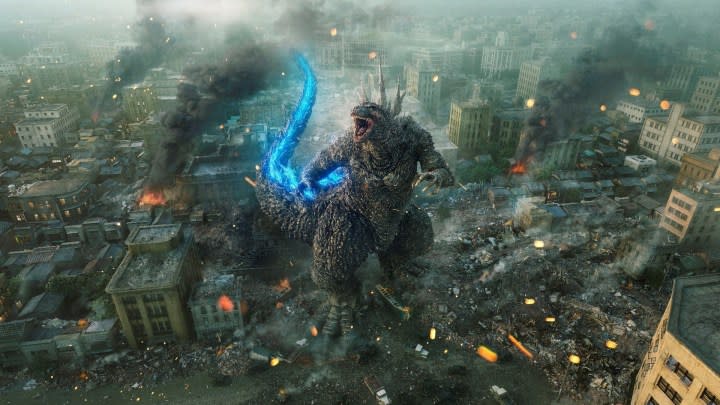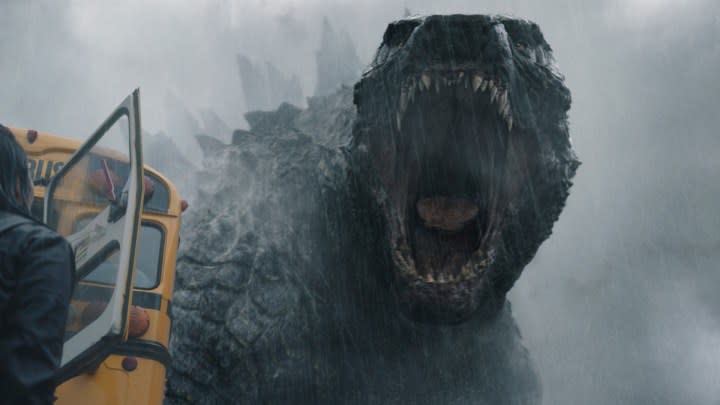At 70, is Godzilla more popular (and better) than ever?
- Oops!Something went wrong.Please try again later.
- Oops!Something went wrong.Please try again later.
This article contains affiliate links; if you click such a link and make a purchase, Digital Trends and Yahoo Inc. may earn a commission.

Hollywood is sweating. After all, its surest things don’t seem so sure right now. Superheroes are washed. Indiana Jones is over. The wizarding world of Harry Potter is closed. Are franchises dead? You’ve read that piece, maybe here. But listen closely, and you’ll hear something else beneath the panicked shriek of movie executives. It’s a familiar otherworldly roar begging to differ — the sound of one franchise, in particular, reminding everyone that when it comes to movie stars, size does sometimes matter. And no, that’s not a Tom Cruise crack.
This year marks the 70th anniversary of Gojira, king of the monster movies, which introduced audiences to the mighty kaiju with a love-hate thing for the Japan he alternately tramples and protects. Godzilla is looking quite spry for his age. And like Mick Jagger, he still draws a crowd in his dotage. In fact, this has already been a big decade for the big guy, who’s notched some new accomplishments in the 2020s: a hit pandemic title fight against King Kong, a stomp through Call of Duty, a Netflix anime, an Eminem song, a whole theme park.
The Godzillassance really kicked into gear these past few months, with consecutive projects increasing the visibility of a character who, historically, has been pretty hard to miss. In November, he made his live-action streaming debut with Monarch: Legacy of Monsters, an Apple TV+ series that caught pretty good reviews, despite the unforgivable sin of reducing Godzilla’s screentime to roughly the length of a post-credits cameo. That show exists in the same universe as the new American G-man movies — including the forthcoming Godzilla x Kong: The New Empire, which will bring these colossal frenemies back to the multiplex in March. And between those two doses of Hollywood kaiju mayhem, Japan airdropped its own version back into U.S. theaters with Godzilla Minus One, which has steadily surpassed the grosses of most of its homegrown predecessors while earning some of the best reviews of the series.

That series is among the world’s longest-running. Godzilla has about a decade on James Bond. And while they’ve been making movies about Sherlock Holmes and Dracula for longer, neither can lay claim to an almost indefinitely active franchise. (Though he took a dozen years off after Y2K, the radioactive reptile has appeared on the big screen every decade since the 1950s.) Godzilla has been destroying cities for so long that his resume is broken into eras. He is a constant, a skyscraper-sized icon who transcends shifting trends.
Try to explain Godzilla’s unbroken grasp on the imagination and you run the risk of overthinking it. He’s a dinosaur the size of a mountain who can shoot electricity out of his mouth. It’s not a great mystery why children of all ages — the young at heart and those with an eternal appetite for destruction — always gravitate to his rampages. “Giant monster go boom” is a premise too primal to go out of fashion. It’s the ultimate lizard-brain logline. We don’t stop enjoying Godzilla because we get old. We get old because we stop enjoying Godzilla.
It’s easy to become a fan of these movies. The barrier to entry is very low. Want to see a guy in a rubber suit — or, okay, the CGI equivalent of the same — stomp through rush hour traffic? Details of plot and character won’t impede you. Some of the Godzilla movies have deeply convoluted stories, and the series has been doing the whole “shared universe” thing since before Kevin Feige was a glint in his father’s eye. (1968’s Destroy All Monsters is basically the Endgame of Suitmation epics.) But few franchises have ever demanded less investment in the stuff around what keeps you coming back to them. It’s why you can jump aboard the G train with almost any movie. They all promise some version of the same awesomely adolescent experience — even the ones, like the original or Minus One, with some real ideas in their head.
Godzilla x Kong : The New Empire | Official Trailer
If you want to get scholarly about it, Godzilla welcomes that, too. He is endlessly accommodating to metaphoric readings. The success of Oppenheimer could give a new generation a greater appreciation for the massive beast’s function as nuclear fallout incarnate. Fear of The Bomb runs through the entire series, but it’s hardly the only subtext you might detect during a full marathon. Godzilla has stood in for the destruction of the environment, science’s thoughtless advance, and natural and manmade disasters. The American entries of recent years have reached for something more mythological, presenting the “titans” as gods of an older world. Whatever he represents, Godzilla remains a useful symbol for universal apocalypse anxiety. He is the spectacle of our impending destruction. He makes the end of the world fun.
If Godzilla’s popularity rarely wanes, it does evolve. What we look for in him tends to change. As with Batman, his movies fluctuate between goofiness and severity. By the late ’70s, he had become a cartoon pro-wrestling superhero, saving Japan, suplexing space invaders, and fathering a profoundly annoying, smoke-ring-blowing offspring. The ’80s revival of the series made him a world-ending menace again, restoring some original-recipe gravity to the material… which then drifted back towards over-the-top goofiness in the years that followed. In the 2010s and beyond, he’s facilitated Bryan Cranston monologues and a withering bureaucratic satire. If the trailers for The New World are any indication, a slingshot reversion to unabashed silliness is imminent.
GODZILLA MINUS ONE Official Trailer 2
Godzilla Minus One shows there’s an appetite for a different kind of Godzilla movie. The film, which has made some $50 million domestically, has arguably attracted viewers who couldn’t tell Mothra from Megalon. It’s one of the most character-driven of the franchise — arguably the one that most breaks from the tradition of human drama as the connective tissue you dutifully sit through to get to the “good stuff.” Even Ishirō Honda’s stark, bleak original doesn’t exactly draw you into the lives of its characters. Minus One does. Pushing beyond atomic allegory, it uses the conventions of the genre to make a point about the supposed nobility of pointless sacrifice, be it the practice of seppuku or the duty of kamikaze pilots. It’s a Godzilla movie with a clear, even moving moral perspective — and people are responding to that in a big way, stateside and overseas.
Godzilla will probably stay popular. After all, interest in him has endured for more than half a century, waxing and waning but surviving with a cockroachian tenacity. The world’s tastes change, but never so much that the king falls out of favor. At least not for long: The rare periods when Godzilla has gone dormant and disappeared from screens, he’s always lurking down in the depths of the movie culture, ready to reemerge with a sequel or reboot. The ultimate proof of his immortality may be his immunity to even the withering death blow of a sellout move. Who but Godzilla could shill for Nike and Taco Bell and still send chills down the collective spine with that mighty, metallic bellow?
Godzilla Minus One is now playing in select theaters. For more of A.A. Dowd’s writing, visit his Authory page.

